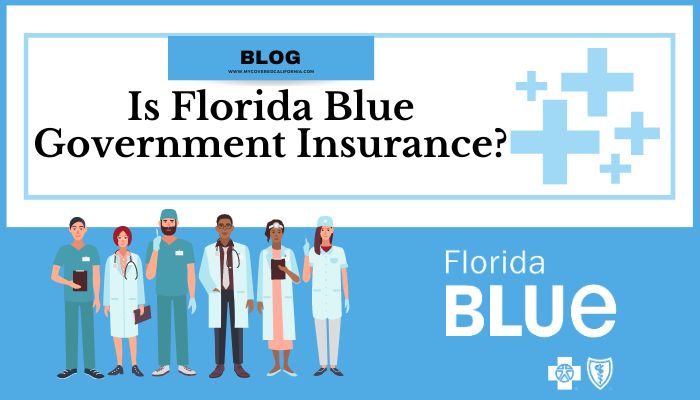Is Florida Blue Government Insurance? Navigating the complexities of health insurance can be overwhelming, and understanding the distinctions between various providers is crucial for making informed decisions.
One question that frequently arises is, “Is Florida Blue government insurance?” This blog aims to clarify this matter and provide a comprehensive overview of Florida Blue’s role in the healthcare ecosystem.

Is Florida Blue Government Insurance?
Choosing the right health insurance plan is essential for safeguarding your well-being and managing your finances effectively. Understanding the nature of Florida Blue insurance empowers you to:
- Make informed decisions: Knowing whether Florida Blue is a government-sponsored program or a private entity helps you determine if it aligns with your needs and preferences.
- Navigate the healthcare system efficiently: By understanding Florida Blue’s position within the broader healthcare landscape, you can optimize your insurance utilization and access appropriate care.
- Avoid misconceptions: Clarifying common questions surrounding Florida Blue’s affiliation can prevent confusion and ensure you have accurate information.
Demystifying Florida Blue: Separating Fact from Fiction
Florida Blue is not government-sponsored insurance. It is a private, not-for-profit health insurance company headquartered in Jacksonville, Florida. Established in 1943, Florida Blue operates as a Blue Cross Blue Shield (BCBS) affiliate, a national network of independent health insurance companies.
Private vs. Government-Sponsored Insurance: Key Differences:
Private health insurance plans, like Florida Blue, are offered by for-profit or non-profit companies. These plans are typically:
- Voluntary: Individuals or employers can choose to purchase coverage based on their needs and budget.
- Premiums: Individuals or employers pay regular premiums to maintain coverage.
- Networks: Plans might have specific in-network providers or preferred provider organizations (PPOs) that offer contracted rates.
Government-sponsored health insurance programs, on the other hand, are funded and administered by the government. Examples include:
- Medicare: Primarily covers individuals aged 65 and over and some younger individuals with disabilities.
- Medicaid: Provides health coverage to low-income individuals and families.
Table: Key Differences Between Private and Government-Sponsored Health Insurance
| Feature | Private Health Insurance | Government-Sponsored Health Insurance |
|---|---|---|
| Provider | Private companies (e.g., Florida Blue) | Government agencies |
| Enrollment | Voluntary | Eligibility based on income, age, or disability |
| Funding | Premiums paid by individuals or employers | Government funding |
| Networks | May have specific in-network providers or PPOs | May have broader provider networks |
Florida Blue in the Healthcare Landscape:
Florida Blue serves as a major health insurance provider within the state of Florida, offering a diverse range of individual, family, and employer-sponsored health insurance plans. They focus on providing affordable coverage, emphasizing preventive care and promoting a healthy lifestyle for their members.
Additionally, Florida Blue actively participates in the broader healthcare ecosystem by:
- Collaborating with healthcare providers to ensure network access and quality care for their members.
- Developing innovative health programs and initiatives to address specific health needs within the communities they serve.
- Advocating for policies that promote affordable and accessible healthcare for all residents.
Understanding Florida Blue’s role as a private health insurance provider empowers you to make informed decisions about your healthcare coverage and navigate the healthcare system with greater clarity.
Understanding Different Types of Health Insurance
In today’s world, securing reliable and affordable health insurance is crucial. Yet, navigating the different types of health insurance plans can be overwhelming. This guide aims to demystify the two main categories: Private Health Insurance and Government-Sponsored Health Insurance, equipping you with the knowledge to make informed decisions for your healthcare needs.
1. Private Health Insurance: Exploring the Options
A. Characteristics of Private Health Insurance Plans:
- Provided by private companies: These plans are offered by for-profit or non-profit insurance companies, not directly by the government.
- Premiums: Individuals or employers typically pay regular premiums to maintain coverage. Premiums can vary based on factors like age, health status, plan type, and chosen deductible.
- Wide range of plan options: Private insurers offer diverse plans with varying levels of coverage, deductibles, copays, and coinsurance. This allows individuals to find plans that cater to their specific needs and budget.
- Flexibility in choosing providers: Depending on the plan, you might have more flexibility in choosing healthcare providers within or outside an insurer’s network. However, out-of-network care typically comes with higher costs.
Examples of Private Health Insurance Providers:
- Aetna
- Anthem
- Blue Cross Blue Shield
- Cigna
- Humana
- UnitedHealthcare
Note: This is not an exhaustive list, and the availability of specific providers may vary by location.
2. Government-Sponsored Health Insurance: Understanding Public Programs
A. Overview of Government-backed Insurance Programs:
These programs are funded by the government and offer health insurance coverage to eligible individuals and families, often based on income, age, disability, or other qualifying criteria.
B. Key Government Health Initiatives:
- Medicaid: A joint federal-state program that provides health coverage to low-income individuals, families, pregnant women, children, and individuals with disabilities. Eligibility and coverage details vary by state.
- Medicare: A federal program that provides health insurance to people aged 65 and over, and individuals with certain disabilities, regardless of income. Medicare generally consists of two parts: Part A (hospital insurance) and Part B (outpatient medical insurance).
- Children’s Health Insurance Program (CHIP): A joint federal-state program that provides health coverage to low-income children who are not eligible for Medicaid.
Table: Summary of Key Differences Between Private and Government-sponsored Health Insurance
| Feature | Private Health Insurance | Government-Sponsored Health Insurance |
|---|---|---|
| Provider: | Private companies | Government (federal or state) |
| Premiums: | Typically paid by individuals or employers | May have premiums, co-pays, or deductibles, but often based on income or other factors |
| Plan Options: | Wide range of plans with varying coverage levels, deductibles, and networks | Limited plan options, often with standardized coverage |
| Provider Choice: | More flexibility, depending on the plan (in-network vs. out-of-network) | May have limitations on provider choice, often requiring referrals for specialists |
| Eligibility: | Based on age, health status, employment, and plan selection | Based on income, age, disability, or other qualifying criteria |
Important Note: This table provides a general overview, and specific details and eligibility criteria can vary significantly. Always consult with the respective government agencies or insurance providers for comprehensive information.
Conclusion
Is Florida Blue Government Insurance? Understanding the different types of health insurance is crucial for making informed decisions. Private health insurance offers more flexibility and choice, while government-sponsored programs often provide coverage for individuals who might not qualify for private plans due to income or other factors.
Carefully evaluate your needs, budget, and eligibility criteria to determine the best fit for your situation. Remember, seeking guidance from healthcare professionals or insurance agents can assist you in navigating this complex landscape and finding the optimal health insurance coverage for your specific needs.
